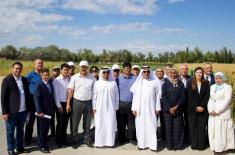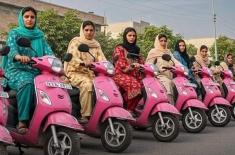
Dir Knife: A Dying Art That Needs KP Govt's Attention
Umer Jamshaid Published September 23, 2025 | 05:40 PM

TIMERGARA, (UrduPoint / Pakistan Point News - 23rd Sep, 2025) Nestled in the picturesque valleys of Dir districts of Khyber Pakthunkhwa, a centuries-old craft of knife is quietly vanishing and with it, a rich cultural identity of the region forged in fire and steel, need Govt attention for its revival.
Dir Knife, which is known locally as the Chaku was once more than just a metal tool but was a symbol of honour, pride, and heritage. A staple in tribal ceremonies, weddings, and even as heirlooms passed from father to son, the Dir knife is now a fading memory in many households due to lack of Govt patronage to this art.
Crafted by generations of blacksmiths in Upper and Lower Dir valleys, these knives are renowned for their sharpness, durability, and artistry. Each blade bears the mark of its maker, often engraved with intricate designs or the proud name of Dir itself.
But today, that clang of the hammer on the anvil which was once a common sound in villages like Khall, Timergara, Shringal, and Rabat is becoming rare as many craftsmen shift to other arts.
“Every Dir knife tells a story,” says 67-year-old Ustad Noor Rahman from Timergara, a master craftsman of Dir Knife who learned this art from his father. “When I came from school, I sat with my baba in a shop who prepared the knife and considered this art a matter of great pride. The name Dir was stamped on every knife that was our identity.”
Rahman estimates that there are now only around 300 small shops and 250 home-based knife makers left in the valley. Rising material costs, inflation, and shifting consumer preferences have made it nearly impossible for artisans to continue its trade, he added.
“The metal we use comes from Wazirabad Punjab at Rs2000 per kilogram,” he says. “After days of forging, grinding, and assembling, most craftsmen take home just Rs700 to Rs15,00 per knife depending on its quality and that includes overhead costs.”
Despite their skill and designs, many artisans are finding it difficult to sustain their livelihood due to increase of metal cost and labour. The local market has been overrun by mass-produced and cheaper alternatives from abroad. Young people, drawn to the convenience of factory-made tools and lacking interest in the labour-intensive craft, are abandoning their ancestral trade.
“We cannot compete with modern imported knives,” says 30-year-old blacksmith Fazal Haq, whose family has been in the trade for three generations. “Art takes time, and time costs money. People today want things fast and cheap,” he said.
In the past, almost every young Pashtun man in KP, especially in Dir carried a handmade knife not as a weapon, but as a token of manhood and tradition.
These knives were gifted at weddings, treasured by elders, and even used in daily life to slice fruits or vegetables.
“I still have a Dir knife gifted by a childhood friend in 1980,” says Riaz Khan, a retired government teacher of Nowshera district while talking to APP. “It still works perfectly. That’s the kind of durability we are talking about. It’s not just a knife but a memory and heritage.”
The decline of this industry is not just an economic loss but its cultural erosion. The Dir knife represented the spirit, resilience, and artistic expression of a people. Its disappearance marks the fading of stories, customs, and a way of life.
“When a Dir knife disappears, a part of our intangible heritage disappears with it,” warns Bakhtzada Khan, a cultural historian and assistant director of archaeology. “It is not just about the blade. It’s about the identity of a people and Dir’s unique heritage needed to be preserved.”
According to Bakhtzada Khan, the craft saw its golden age during the rule of Nawab Sharif Khan of Dir, who established an arms factory and promoted local craftsmanship. But in the absence of modern policy support or preservation efforts, that legacy now hangs by a thread.
Amidst the gloom, efforts are underway to keep the embers glowing in Dir. Some NGOs and heritage groups have stepped in, offering training workshops, setting up exhibitions, and promoting Dir knives through digital platforms.
“We are helping artisans sell globally through e-commerce,” says Bakhtzada Khan, adding there is a strong appreciation for handcrafted items abroad.” Some younger craftsmen are embracing technology by sharing their forging processes on Instagram, YouTube, and TikTok, attracting curious audiences from around the world.
There's growing potential for exporting these knives as collectible items or high-quality kitchen tools if only there were proper government facilitation. “Short video stories on social media could bring this art back into the spotlight,” suggests Riaz Khan. For now, the sound of forging steel echoes faintly in the valleys of Dir and what was once a source of regional pride is at risk of being forgotten.
KP government’s role could be pivotal through special grants to blacksmiths, skill development programs, and export facilitation, the Dir knife could yet be revived and reintroduced to a world that still values handmade craftsmanship.
The question is will the Dir knife remain a proud emblem of culture or become just another relic in a museum of lost arts? As older blacksmiths retire and their forges go cold, time is running out to save this remarkable piece of heritage in Dir.
APP/fam/1700
Recent Stories

Saudi Arabia’s grand mufti Sheikh Abdulaziz Al-Sheikh passes away

NEXT PRO ARRIVES SOON IN PAKISTAN: OPPO A6 PRO SET TO REDEFINE TOUGHNESS AND POW ..

Rulers of Emirates congratulate Saudi King, Crown Prince on National Day

Abu Dhabi Fund for Development inaugurates Agricultural Production Systems Devel ..

Vivo Unveils the V60 in Pakistan: Ushering in a New Era of Portrait Mastery

ALEC Holdings announces offer price range, IPO subscription period on DFM

Presight, Shorooq launch $100M global fund to accelerate AI innovation

UNGA Palestine conference witnesses leaders’ Mics cut off

Afghan boy survives hiding in plane’s landing gear to Delhi

Sindh govt to provide free electric Scooters to women

TRENDS, STRATEGIECS sign research cooperation agreement

Nahyan bin Mubarak receives delegation from Arab Parliament
More Stories From Pakistan
-
Deaf students showcase talents, creativity on IDSL 2025
2 minutes ago -
Dir Knife: A dying art that needs KP Govt's attention
12 minutes ago -
Secretary Housing appreciates PHA’s initiatives for beautification of Rawalpindi
12 minutes ago -
IHC seeks answer on plea seeking meeting between PTI founder and Bushra Bibi
12 minutes ago -
Dera police praised for swift arrests in Trader’s murder, robbery cases
12 minutes ago -
Pakistan launches CEGA to incubate 200 startups, train 10,000 in gaming, animation
12 minutes ago
-
Court adjourns Khawar Maneka torture case till Sep 29
12 minutes ago -
Court adjourns protest, riots cases against PTI leaders
12 minutes ago -
SU to remain open tomorrow despite district holiday
12 minutes ago -
Two police officers of IHC security branch get promotions
12 minutes ago -
Punjab’s youth at the crossroads: Policy dialogue charts path to harness demographic dividend
12 minutes ago -
RPO visits Safe City project, police school
22 minutes ago